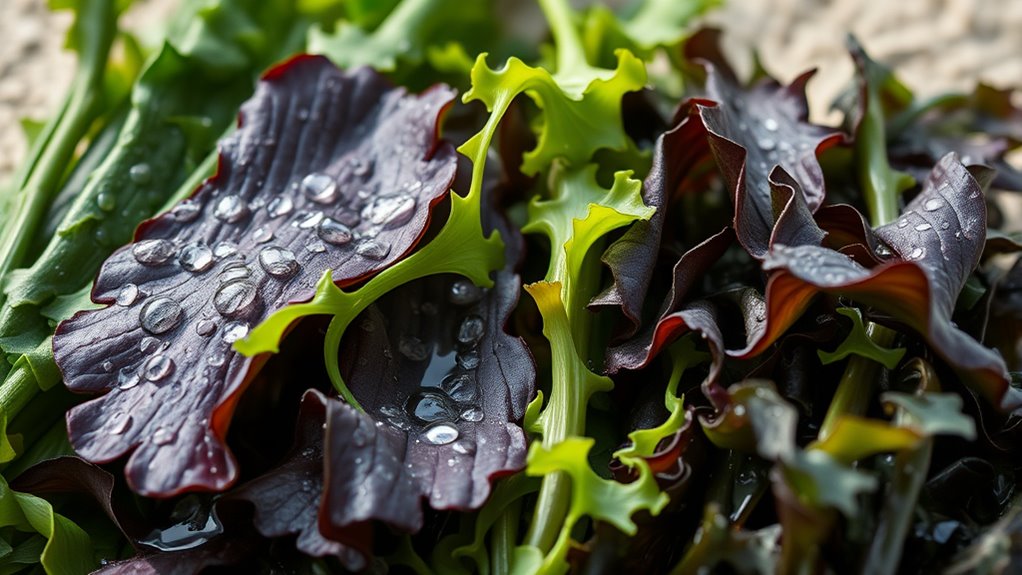Sea vegetables boost your immune system, fight inflammation, and reduce oxidative stress with their rich nutrients and antioxidants. They support strong bones, healthy hormones, and muscle recovery thanks to minerals like calcium, iodine, and magnesium. Their fiber and plant proteins aid digestion and overall wellness. Plus, they’re easy to add to meals in many forms. Keep exploring if you want to discover how these versatile foods can enhance your health naturally.
Key Takeaways
- Support immune function, reduce inflammation, and promote overall well-being with essential nutrients and bioactive compounds.
- Rich in antioxidants and vitamins that help combat oxidative stress and promote longevity.
- Provide vital minerals like calcium and iodine, enhancing bone health and supporting hormonal regulation.
- Contain plant-based protein and magnesium to aid muscle building, recovery, and physical performance.
- Versatile in culinary uses, offering a nutritious addition while supporting balanced, mindful consumption.
Supports Immune Function and Combats Inflammation
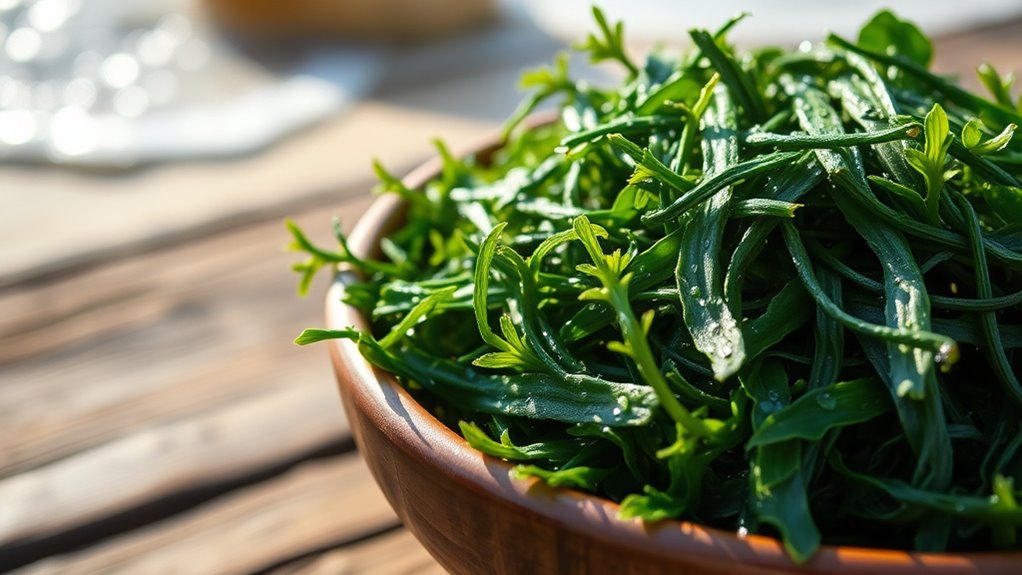
Sea vegetables like Ulva lactuca boost your immune system and fight inflammation by providing essential nutrients and bioactive compounds. Iodine in seaweed supports proper thyroid function, which is crucial for immune regulation. The bioactive compound ulvan, a sulfated polysaccharide, exhibits immunomodulating and anti-viral properties that help strengthen your body’s defenses. Additionally, the high fiber content, including soluble and insoluble fibers, promotes gut health by supporting a healthy microbiome and reducing systemic inflammation. This improved gut health enhances your immune response and lowers inflammatory markers. The combination of minerals, fiber, and bioactive compounds creates a powerful synergy that bolsters your immune function and helps combat chronic inflammation, keeping your body resilient against illness and disease. Moreover, the presence of antioxidants in sea vegetables further helps to reduce oxidative stress, protecting cells from damage and supporting overall health. Advances in automation technology within the food industry are also improving how sea vegetables are harvested and processed, ensuring better quality and sustainability. Additionally, these technological improvements can enhance the nutrient preservation during processing, maximizing health benefits.
A better understanding of these bioactive compounds continues to drive research into their full potential for supporting health.
Promotes Longevity and Reduces Oxidative Stress

Consuming sea vegetables regularly can help promote longevity by reducing oxidative stress and protecting cellular health. The antioxidants in sea lettuce activate enzymatic pathways that boost glutathione production, a powerful compound that neutralizes free radicals. The chlorophyll in seaweed further fights oxidative damage by scavenging free radicals and resisting digestive enzymes. Ulvan, a sulfated polysaccharide in sea lettuce, also exhibits antioxidant properties that combat oxidative stress at the cellular level. These bioactive compounds work together to lower oxidative damage, which is linked to aging and chronic diseases. Incorporating antioxidant-rich foods into your diet can be a simple yet effective way to enhance longevity naturally. By reducing oxidative stress, sea vegetables help preserve cellular integrity over time, supporting a longer, healthier life.
Enhances Bone and Skeletal Health

Because of its rich mineral content, sea lettuce substantially supports bone and skeletal health. Its high calcium level—about 30 micrograms per gram—outperforms Parmesan cheese and milk, strengthening your bones. The sulfur compounds in sea lettuce release hydrogen sulfide (H₂S), which may boost bone density and promote skeletal health. Research indicates that H₂S-generating molecules could help prevent osteoporosis by enhancing bone formation. Regular consumption supplies essential nutrients that maintain bone mineral density and reduce age-related loss.
| Nutrient | Benefit |
|---|---|
| Calcium | Supports strong, healthy bones |
| Sulfur compounds | Promote bone density, skeletal health |
| Bone health | Reduced fracture risk, better skeletal strength |
Maintains Thyroid Function and Hormonal Balance
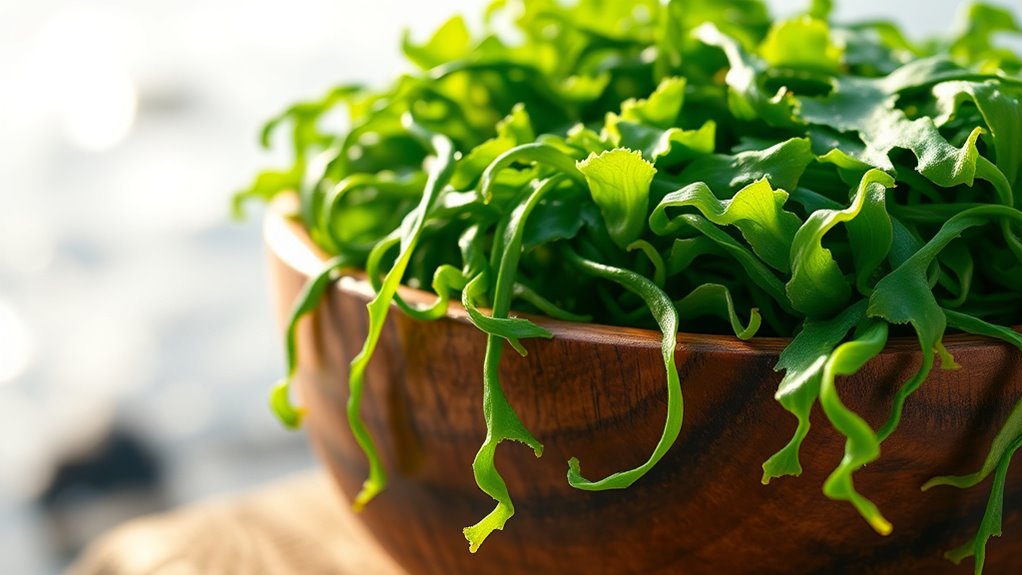
Sea vegetables are a natural source of iodine, which is essential for producing thyroid hormones like T3 and T4. The amino acid tyrosine works with iodine to support healthy hormone synthesis. Eating moderate amounts can help keep your thyroid balanced and prevent deficiencies. Additionally, incorporating sustainably harvested sea vegetables can promote environmental sustainability while supporting your health. Proper iodine intake from sea vegetables also contributes to overall nutritional balance, ensuring your body functions optimally. Recognizing the importance of trust issues can help you make informed dietary choices and maintain a healthy relationship with your food sources. Understanding essential nutrient interactions further supports the benefits of including sea vegetables in your diet. Studies indicate that optimal angles can improve the effectiveness of nutrient absorption from foods.
Iodine’s Role in Hormones
Iodine is an essential mineral that directly influences your thyroid hormones, T3 and T4, which control your metabolism and energy levels. When you consume sea vegetables, you’re providing your body with iodine, supporting the production of these hormones. Proper iodine intake helps your thyroid function at its best, ensuring your metabolism runs smoothly. Just one gram of sea lettuce offers about 43 micrograms of iodine, meeting nearly a third of your daily needs. Maintaining adequate iodine levels from sea vegetables can prevent hypothyroidism, a condition marked by fatigue, weight gain, and sluggishness. Eating moderate amounts of seaweed naturally sustains your iodine levels, reducing reliance on supplements. However, excessive consumption can disrupt hormonal balance, so moderation is key for maintaining healthy thyroid function and overall hormonal harmony. Additionally, sea vegetables contain other essential nutrients that support overall health and well-being.
Tyrosine and Thyroid Production
Tyrosine, an amino acid found in sea vegetables, plays a crucial role in supporting your thyroid’s hormone production. It works alongside iodine to help synthesize thyroid hormones like T3 and T4, which are essential for regulating your metabolism, growth, and energy levels. Consuming iodine-rich seaweed provides a natural source of tyrosine, ensuring your thyroid has the necessary building blocks to produce enough hormones. When your intake of tyrosine and iodine is adequate, your thyroid can function at its best, preventing issues like hypothyroidism. Properly supporting thyroid hormone production with sea vegetables helps maintain overall health, supporting growth, development, and metabolic balance. Including seaweed in your diet is a simple way to boost tyrosine and iodine levels naturally. AI safety measures are also increasingly relevant in healthcare technology to ensure accurate diagnostics and patient data security. Additionally, the presence of nutrients essential for health in sea vegetables enhances their overall benefits for thyroid support.
Maintaining Hormonal Balance
Supporting your thyroid’s health through proper nutrient intake helps maintain hormonal balance and overall well-being. Sea vegetables like kelp and nori are rich in iodine, which is crucial for producing thyroid hormones T3 and T4. These hormones regulate metabolism and support hormonal balance. About 43 micrograms of iodine per gram in sea lettuce helps keep your thyroid functioning properly. Additionally, tyrosine, an amino acid in seaweed, works with iodine to support the synthesis of thyroid hormones. Consuming moderate amounts of sea vegetables can prevent iodine deficiency-related issues like goiter and hypothyroidism. However, too much iodine can disrupt hormonal balance, so moderation is essential. Incorporating sea vegetables thoughtfully supports your thyroid health and promotes stable hormonal function. Proper nutrient intake plays a vital role in maintaining healthy thyroid function and overall hormonal stability.
Aids in Muscle Building and Physical Recovery
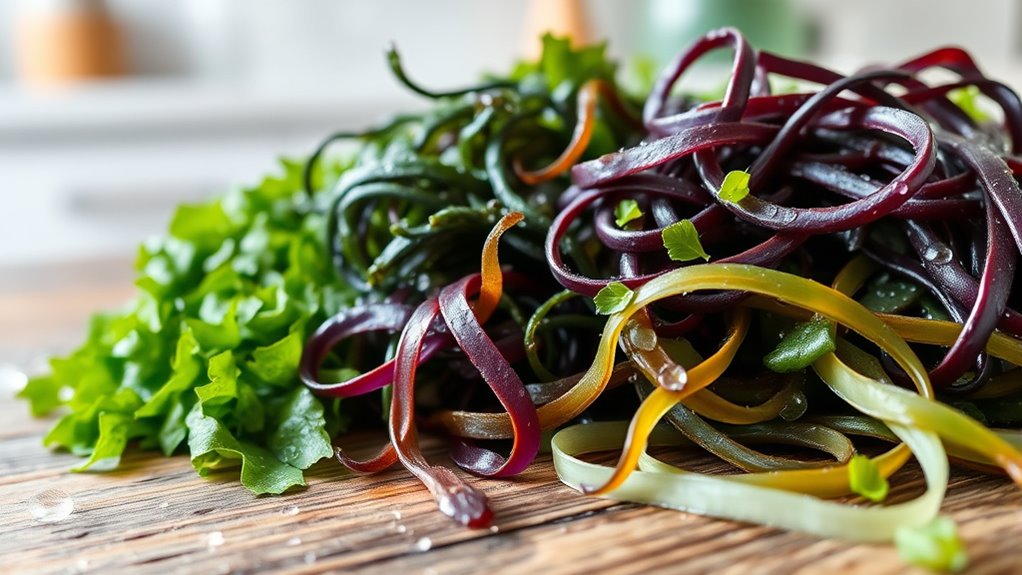
Sea vegetables like sea lettuce are packed with plant protein, supporting muscle repair and growth. Their magnesium content helps reduce cramps and speeds up recovery after workouts. Including them in your diet can boost your physical performance and help prevent muscle loss. Additionally, their nutritional benefits contribute to overall health and endurance. Consuming sea vegetables also provides essential vitamins and minerals that support immune function and energy levels. Incorporating these nutrient-dense foods into your meals can also enhance cell regeneration, promoting faster recovery and improved strength. Their rich antioxidant properties help combat oxidative stress caused by intense physical activity. Furthermore, some sea vegetables contain bioactive compounds that support inflammation reduction, aiding in quicker recovery.
Rich in Plant Protein
Sea vegetables like seaweed are excellent sources of plant-based protein, containing around 15%, which is twice as much as many beans and similar to tofu. This makes seaweed a powerful addition to your diet, especially if you’re looking to support muscle growth. The plant protein in seaweed includes all essential amino acids, making it a complete protein source perfect for muscle repair and recovery. These amino acids help rebuild tissues and sustain your physical performance. Additionally, seaweed provides minerals like magnesium, which aids muscle contractions and reduces cramps. Incorporating sea vegetables into your meals can also offer additional nutritional benefits, supporting overall health and wellness. Given the rising divorce statistics, maintaining good health is more important than ever for overall well-being.
Supports Muscle Repair
Rich in protein and minerals, sea vegetables like sea lettuce play an essential role in muscle repair and recovery after physical activity. With about 15% vegetable protein, sea lettuce supplies essential amino acids that support muscle tissue synthesis. Its high protein content helps you rebuild damaged muscles efficiently. Additionally, sea vegetables provide roughly 22.5 milligrams of magnesium per gram, indispensable for muscle contractions, energy production, and reducing soreness. Magnesium also helps prevent cramps, speeding up recovery. Regular consumption of sea vegetables guarantees your muscles get the nutrients needed to repair and strengthen. Incorporating sea vegetables into your diet can also support nutrient absorption, ensuring your body maximizes the benefits of these vital minerals. Combining their rich protein profile with mineral support, sea vegetables are an excellent natural aid for maintaining muscle health, enhancing strength, and supporting faster physical recovery after workouts.
Provides Essential Nutrients for Overall Well-Being
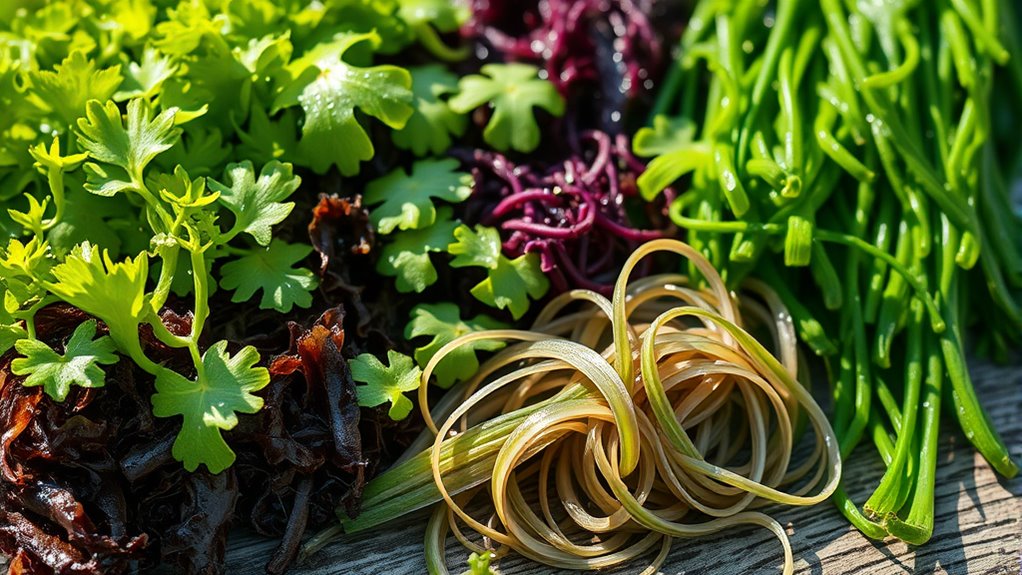
Because they are packed with essential nutrients, sea vegetables play a crucial role in supporting your overall well-being. They deliver a variety of vital elements, including:
Packed with essential nutrients, sea vegetables support your overall well-being and vital health functions.
- Iodine, which supports healthy thyroid function and hormone regulation.
- Vitamins like A, C, E, K, and B-complex, essential for immune health, skin, and energy.
- Minerals such as calcium, magnesium, iron, and zinc, necessary for bone strength, metabolic processes, and immune support.
- Dietary fiber and plant-based protein, aiding digestion and muscle repair.
Consuming sea vegetables regularly helps you meet your nutritional needs, promotes hormonal balance, and boosts your overall health. Their rich nutrient profile ensures you get essential vitamins and minerals naturally, supporting your well-being every day.
Offers Versatile Culinary Uses and Easy Incorporation

Integrating sea vegetables into your meals is simple and offers a variety of delicious options. Seaweed, in its many forms, can enhance both flavor and nutrition effortlessly. You can add dried seaweed sheets to soups, salads, or even rehydrate them for stir-fries and casseroles. Flaked or powdered seaweed makes a quick addition to smoothies, popcorn, or salads, boosting your nutrient intake with ease. Its versatility extends to acting as a natural gelling agent like agar or carrageenan in desserts and plant-based recipes. With whole leaves, flakes, powders, or capsules, seaweed fits seamlessly into various culinary uses, making it easy to enjoy its health benefits. Incorporating sea vegetables into your diet is convenient, tasty, and a smart way to diversify your nutrition.
Addresses Safety and Precaution Considerations

While sea vegetables offer many health benefits, it’s important to consume them mindfully to avoid potential risks. To stay safe, consider these points:
Enjoy sea vegetables wisely by consuming in moderation and choosing reputable sources for safe, healthful benefits.
- Limit your intake to prevent iodine overdose, which can cause thyroid issues like goiter or hyperthyroidism.
- Choose reputable, organic sources to reduce heavy metals such as arsenic, lead, and cadmium that can accumulate in seaweed.
- If you’re on blood-thinning medications, like warfarin, watch your seaweed consumption due to its high vitamin K content.
- People with kidney problems or high potassium levels should avoid large amounts, as sea vegetables contain significant potassium that could be harmful.
Practicing moderation and sourcing wisely helps you enjoy sea vegetables safely and healthily.
Highlights Different Types of Sea Vegetables and Their Benefits
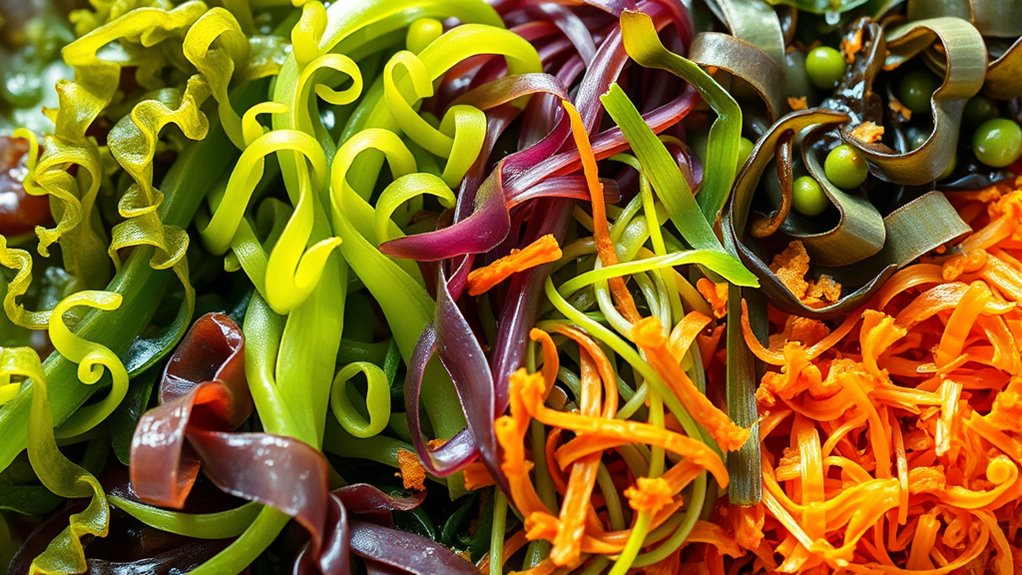
Different types of sea vegetables offer a variety of flavors and health benefits, making them versatile additions to your diet. Seaweed such as nori, kelp, kombu, arame, dulse, and laver each have unique nutrition profiles and taste profiles. Brown algae like kelp and wakame contain carotenoids such as fucoxanthin, which provide antioxidants and anti-inflammatory benefits. Red seaweeds like nori and dulse are rich in phycoerythrin, phycocyanin, and essential minerals, enhancing their nutritional value. Green seaweeds like sea lettuce offer chlorophyll and ulvan, supporting overall health. Microalgae such as spirulina and chlorella are nutrient-dense, often used as supplements. Incorporating these sea vegetables boosts your intake of antioxidants and other crucial nutrients, supporting your well-being.
Frequently Asked Questions
Are Sea Vegetables Good for You?
You might wonder if sea vegetables are good for you, and the answer is yes. They’re packed with essential nutrients like iodine, vitamins, and antioxidants that support your thyroid, boost your immune system, and improve digestion. Including them in your diet can help with weight management and reduce inflammation. Just remember to enjoy them in moderation to get the benefits without overdoing the iodine intake.
What Are the Healthiest Sea Plants?
You ask about the healthiest sea plants, and the answer comes alive with vibrant choices. Dried nori and wakame deliver iodine, supporting your thyroid and metabolism. Kombu, rich in iodine, should be enjoyed in moderation. Red seaweeds like dulse and laver provide essential nutrients, while microalgae such as spirulina and chlorella boost your protein and antioxidants. These sea plants collectively nourish, energize, and strengthen your body naturally.
Is It Healthy to Eat Seaweed Every Day?
Eating seaweed daily can be healthy if you do so in moderation. It provides essential nutrients like iodine, vitamins, and antioxidants that support your immune system and digestion. However, too much might cause iodine overload or expose you to heavy metals like arsenic. Balance your intake with other foods, and if you’re on medications or have thyroid issues, consult your healthcare provider to ascertain it’s safe for you.
How Much Sea Vegetables per Day?
Like a sprinkle of magic, a little sea vegetable can boost your health. You should aim for about 1 to 3 grams daily, which gives you essential nutrients like iodine and minerals. Eating 4 to 5 grams provides your daily iodine needs but going beyond that risks thyroid issues. Enjoy moderate servings, like a small sheet of nori or a teaspoon of flakes, a few times a week for best benefits.
Conclusion
Think of sea vegetables as nature’s hidden treasure chest, packed with nutrients that boost your health day by day. Just like discovering a secret ingredient transforms a simple dish into a feast, adding sea vegetables can elevate your well-being. Whether you’re aiming to strengthen your immune system or support your bones, these ocean gems are easy to include in your diet. Immerse yourself and access their incredible benefits—your body will thank you!

